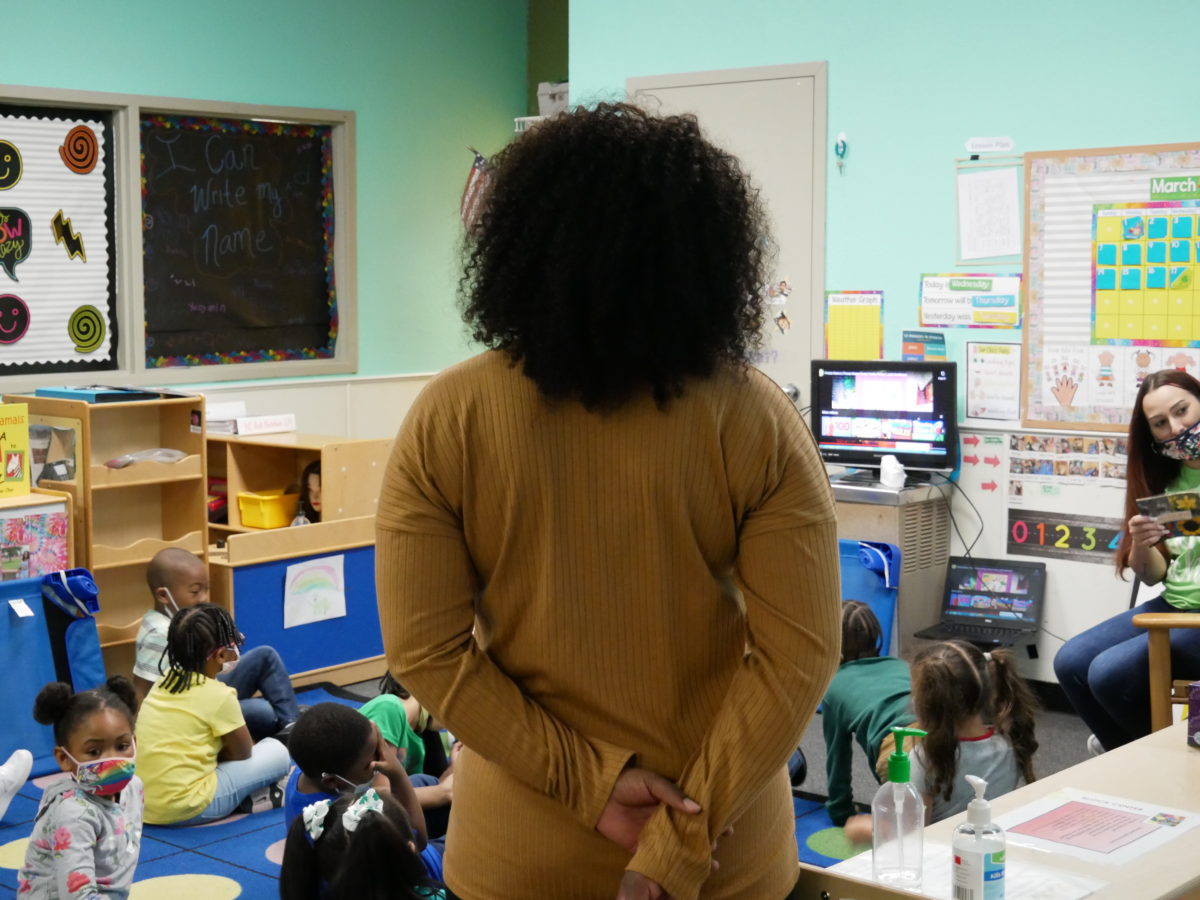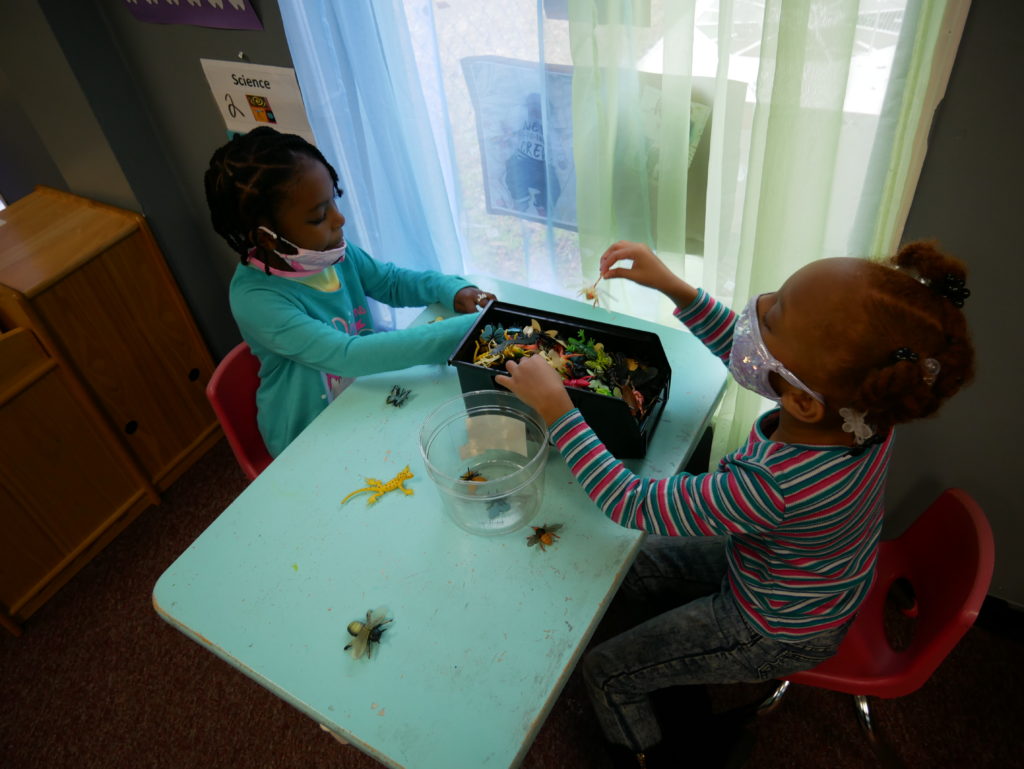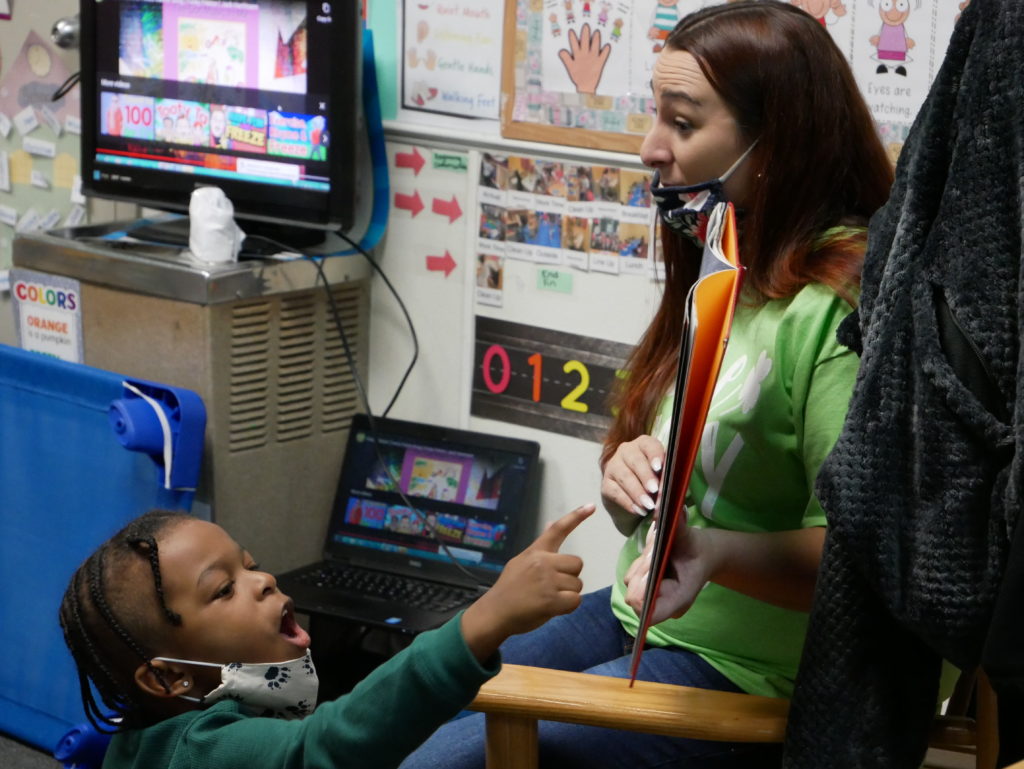
In the last three years, Tenisha McGhee has gone from being a parent of a child attending East Carolina Kiddie College, a private child care center in Pitt County, to buying the center with her husband and leading it through a pandemic.
McGhee, a 31-year-old with a background in social work and education, quickly learned the struggles of the child care business — lots of regulations, not a lot of money. For the first year, she didn’t pay herself so the center could make ends meet. Then the pandemic added a layer of stress and fear, but also hope that others might start to appreciate the early care and education workforce.
“People are just starting to see that … we are essential, we do need help, and we want to be here, but it has to be affordable for us to be here,” McGhee said.

Tenisha McGhee, director of East Carolina Kiddie College, says more public funding is needed for the valuable, and expensive, task of early care and education. 
NC Pre-K teacher Victoria McCullough reads a book about animal sizes to Christian Hines and his classmates. McGhee had to scramble to find two new teachers during a pandemic, including McCullough.
While juggling work and going back to school for early education credentials, McGhee was also raising two sons. Her third is on the way. Being pregnant while working through the pandemic has made things even scarier, she said.
“It’s been a rollercoaster,” McGhee said. Through “long nights and lots of stress,” McGhee said, her biggest concern has been her teachers — finding them, paying them (even when the center was closed for a COVID-19 outbreak in December), and making sure they feel valued. On a recent visit to the center, McGhee was planning a dessert bar for the center’s staff.
“I don’t feel like it’s a business,” she said. “We’re a big family.”
But when it comes to retaining teachers, McGhee said: “There’s (only) so much we can offer. We’re kind of stuck.”
Teachers at the center make between $9 and $11 an hour (outside of two NC Pre-K teachers, who make $3,000 per month). She recently increased the center’s tuition to $975 a month for infant care and $910 a month for children older than one year.
“You know it’s not affordable,” McGhee said. “As a director, I have two boys and I have one on the way. If I wasn’t in this position, I don’t know what I would do.
“We have to do it. That doesn’t even pay one staff’s salary for the month, because there’s so much that we have to pay for — rent, lights, water, expenses. Lights go out when they want to. Our washing machine just broke last week.”
McGhee’s challenge demonstrates issues with the child care model that educators and advocates hope the pandemic brought to light — enough to spark change and attract investment.
“Parents pay literally as much as they can bear, while the costs are subsidized on the backs of the early childhood workforce, who largely are women of color,” said Javaid Siddiqi, president and CEO of the Hunt Institute, on a recent Education Writers Association webinar.

“If we have to close our doors, who’s going to watch the children?”
McGhee had to find two new teachers last year during the pandemic, and she said “it came down to the wire.”
Nationally, 200,000 early educators have left the workforce during the pandemic, said Lea Austin, executive director of the Center for the Study of Child Care Employment. The center released an early educator workforce index in February, which shows 2019 median wages for child care directors in North Carolina at $20.68 per hour, a 5% decrease since 2017 when adjusted for inflation.
The report also breaks down teacher compensation by age range, showing differences in pay across early childhood settings. North Carolina 2019 median wages for child care workers were $10.62 (compared with $11.65 nationally), $12.83 for preschool teachers ($14.67 nationally), and $27.89 for kindergarten teachers ($32.80 nationally).
“The entire market-based early care and education system is profoundly flawed and needs to be redesigned,” the report’s policy recommendations say.
Supporting early educators across settings
One of the teachers McGhee found at the last minute was Erin Dail. “The main reason I get up every day is to make a difference in a young child’s life,” Dail said.
In the past 15 years, Dail has worked with all age groups and been an administrator in child care, but she said her new position as a lead NC Pre-K teacher brings the highest pay she’s ever made.
“I feel that what we do is as important as a doctor or someone in the medical field,” she said. “… Preparing children for kindergarten is not an easy task.”

Pre-K students Kyzer Vaugh and Karter Stewart play in their St. Patrick’s Day attire. 
NC Pre-K teacher Erin Dail joins her students in block-building during center time.
Dail, who is finishing her bachelor’s degree while working, said she is looking to stick with pre-K or kindergarten. She said she would be interested in working in a public school setting at some point.
As teachers become more educated, McGhee said, the school district is often her biggest competitor.
The recent remedial plan filed in the long-running education lawsuit called Leandro speaks to this trend: “Because of the large pay discrepancy between early childhood and kindergarten teachers, many early childhood teachers shift to teaching kindergarten after receiving a bachelor’s degree.”
The remedial plan calls for several early educator workforce supports: matching early childhood teachers’ salaries with educational attainment, ensuring teachers have access to health insurance, increasing scholarship funding for early childhood professionals, and creating an early educator preparation program similar to NC Teaching Fellows, which covers students’ tuition in exchange for a teaching commitment in a certain area or subject matter.
Gov. Roy Cooper’s budget proposal, released last week, includes $36 million for wage supplements and $9 million for pay parity among early educators with the same B-K license in private and public settings.
“Seven percent, or 2,500, of North Carolina’s early educators maintain a B-K license but are compensated approximately $27,000/year less than aligned K-12 licensed educators,” the document says. “Salary and benefits supplements narrow the compensation gap between B-K licensed educators in private child care and their K-12 counterparts.”
More overall funding for programs like child care subsidy and NC Pre-K could also go a long way, McGhee said. Her first priority with any funding would be paying her teachers more.
Both the Leandro plan and the governor’s proposal call for increasing funding to these programs. A bill was also filed by House Democrats this month, House Bill 364, to allocate $25 million over two years to expand NC Pre-K to any child seeking to attend. House Bill 262, which has bipartisan sponsorship, would give $60 million over two years to Smart Start, partly to help with “child-care related activities” and subsidy assistance for parents.
“I don’t know what the perfect solution is,” McGhee said. “If we have to close our doors, who’s going to watch the children? Who’s going to be here for the children? Who’s going to be helping these parents who have to work? I am hopeful that something positive going forward is going to be done.”
Recommended reading







